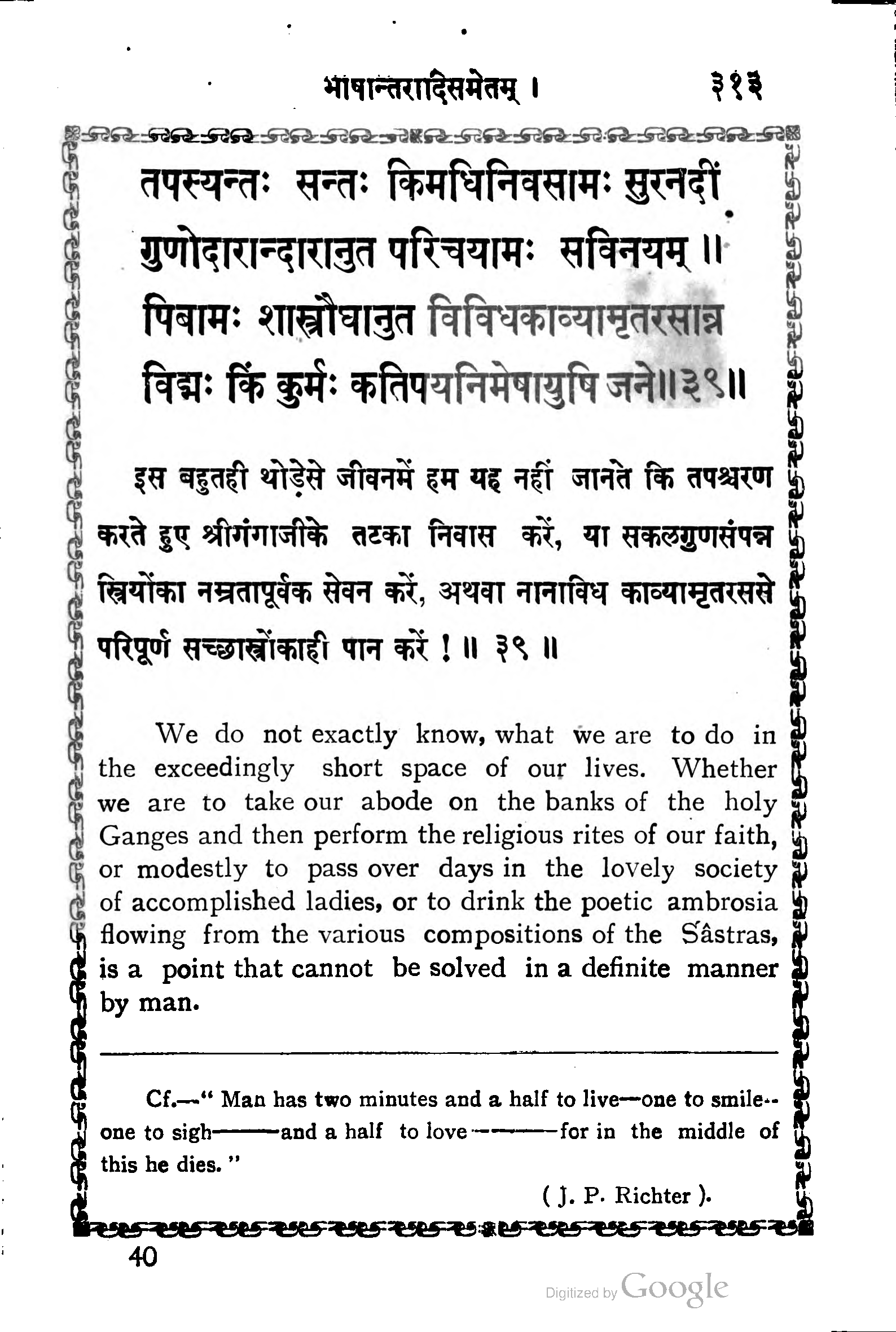Ryder
Tawney
Mādhavānanda
Telang
verse

Text (not proofread)
तपस्यन्तः सन्तः किमधिनिवसामः सुरनदीं
गुणोदारान्दारानुत परिचरामः सविनयम् ।
पिनाम : शास्त्रौघानुत विविधकाव्यामृतरसा
न्न विद्मः किं कुर्मः कतिपयनिमेषायुषि जने ॥ ४० ॥
footnote

Text (not proofread)
XL . ( 6 ) ° जोदारान् ; ° णोदर्कान् [ C. सविनयम् ; सुविनयम् B. स्वविषयान्
T. K. G. सविनयान् , Bo . ( orig . Bo.n. ) ( c ) ° स्त्रीया ; स्वार्थी ° Bo.n.
● नुन न्द्रुत C. M.
endnote

Text (not proofread)
St. XL . - तपस्यन्नः- See Siddh . Kanm . II . , 229. For the acen
eative of सुरनदीम् see Siddh . Kanm . I. , 261 , where however नि is .
not , though अघि is , among the Upasargas enumerated . Resorting
to the Ganges is equivalent to abandoning the world . Râmarshi
says एनेन किं नर्ममोक्षावेष सेवेमेति ( sic ) भाव : गुणोदाराः = गुणा :
उदारा महान्तो येषां ते says Ramarshi , but गुणेरुदारा : is less strain
ed and gives quite as good a meaning . On the second line Râina
rshi says एलेन किं काममेन सेवेम ( sic again ) इति भावः On the third
line he says उन अथवा शास्त्रीयान् बहूनथन् शासन्ति उपादेशान्ति तानि शास्त्राणि
वेदान्तमीमांसाप्रभृतीनि तेषामोघान्समूहान् किं पिबामः कि शृणुमः | किंलक्षणान् शास्त्रीमान्
विविधकाव्यामृतरसान् विविधा वर्मार्थकाममोक्षवणेनेन अनेक प्रकाराः काव्यामृतानो श्लोकम
बन्धामृतानी रसा : आस्वादा उत्कृष्टश्रवणजनितानन्दवशन आश ( sic स ) क्तयो वा येत्र
ने तथा तान् एनेनार्थ सेवेम मोक्षं वा सेवेम इति भावः । विद्वत्तया धनमुपाज्येने
अथवा शास्त्रीवगाहनेन तत्त्रज्ञानान्मोक्षं प्राप्नुयामिति वेति भावः ॥ I do not think it
a good interpretation to take विविध ° & c . as an adjective qualify
ing शास्त्रोपान् . They ought I think to be taken separately . And ses
Miscellaneous Stanza 27. न विद्मः किं कुर्मः we do not know what
we should do . जन - जन्यते उत्पद्यते इति जनो देह : ( Rāmarshi ) लोक , according
to the other commentary . It means mankind . “ When man is so
short - lived what should we do ? " - S'ikharini .
Kosambi
verse

Text (not proofread)
तपस्यन्तः सन्तः किमधिनिवसामः सुरनदीं
गुणोदारान् दारानुत परिचरामः सविनयम् ।
पिबामः शास्त्रौघानुत विविधकाव्यामृतरसान्
न विद्मः किं कुर्मः कतिपय निमेषायुषि जने ॥ १७२ ॥
footnote

Text (not proofread)
172 Om . in GVS2387 , probably missing fol . in original . a ) C इह ;
D उत ; Est at I M1 अपि ; Ec [ 1 ] G 1M 2 इति ( for अधि- ) . Est न वसामः . 6 ) Ja Ya
धारान् ( for दारान् ) . F3 परिचरयामः ; X 2 परिचयाम :; M4.5 परिसराम : F2 सविनयी ; Wt
Y 2 स्वविषयान् ; M + 5 सकुतुकं - ) Aot Eot शास्त्रौधान् ; B शास्त्रोत्थान् ; Eoc शस्त्रवान् ;
Est शस्त्रौवाधान् ; F5 Y1 1 14 0 श | स्वार्थान् ; JM . शास्त्रांबूनि . E0 2.5 ( and Ec ) द्रुत E3t . t
om . ( for उत ) . [ E com . द्रुत - - श्रुत for स्रुत ? ] Est it विविधतम ; G1 उत वदत ( for
उत विविध- ) . Hit -कायामृत J3 -रसं ( for - रसान् ) . -- – 4 ) D Xat न विघ्नः W3 निमेषायुधि .
BIS . 2493 ( 1001 ) Bhartr ed . Bohl . 3. 77. Haeb and lith ed . III . 74 lith .
ed . II . 41 , I. 76. Galan 70 ; SIHV app . I f 1a . 4 ( Bh . ) .

